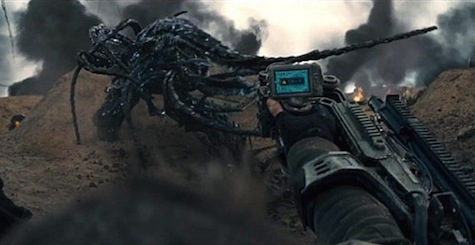There’s this part in the second level on the easy path of StarFox 64 when a giant, wildly impractical robot-spaceship adversary pretends to give up for like three seconds. This trick only works the first time and when you know what’s coming a second time, you’re already thumbing your spaceship to safety way before anything crazy happens. The most unrealistic thing about video games isn’t talking foxes or giant robots, but instead, the idea that not only can you have do-overs, but that the do-overs themselves are necessary to success.
The Edge of Tomorrow—the latest Tom Cruise sci-fi action summer action vehicle—is exactly like a lot of video games because its narrative structure combined with its shoot-em-up aesthetic makes the do-over both seem simultaneously cheap and essential.
Light spoilers for The Edge of Tomorrow
As if its alien tendrils are poised on the pulse of the American psyche, The Edge of Tomorrow initially posits Tom Cruise’s leading man not as hero, but instead as an overblown PR scumbag who will try weasel his way out of just about anything. If the movie didn’t have so much other stuff it wanted to do, Cruise’s William Cage could easily be a classically redeemed Dickensian character: a sort of Scrooge meets ExoSquad sort of guy. But more smartly, the film just resorts to giving us lots of scenes where Tom Cruise comically bites the dust. From alien shootings, to explosions, and pretty much everything but a cartoon anvil falling on him, Cage’s life is reset over and over again. If the character of Cage was a nice person, this might seem tragic, but because he’s painted as a blackmailing wuss, even a pro-Cruise audience member will be laughing.
But thanks to a chance meeting with super-soldier Rita (Emily Blunt) we and Cage learn there is more to his Groundhog Day situation than some sort of everybody-hates-Tom Cruise-wish-fulfillment. Instead, Cage must use his knowledge of previous events to explore different scenarios which will eventually result in the salvation of the human race. And though these stakes are laughably high, The Edge of Tomorrow doles out its level-up style pay-offs with such video game precision that even the most jaded won’t worry too much if any of this really makes any sense. The aliens (inexplicably called “mimics”) can manipulate time in order to execute perfect planet-dominating strategies. Rita, and later Cage, accidentally inherit this “power,” and through their respective deaths can reset the day in which they live.

Save for a few last-minute deus-ex machina shenanigans, most of what ensues from this premise sticks to its giant robot guns: through sheer repetition, practice, and reevaluation, the puzzle of the film’s conflict can be solved. The Edge of Tomorrow isn’t really a good movie at all, but uses its format so effectively that it hardly matters. Each time Tom Cruise reawakens, it’s not with the comic disorientation of Bill Murray in Groundhog Day or with the eerie psychological Guy Pierce confusion of Memento. Instead, The Edge of Tomorrow gives you all the facts and doesn’t ever tease at some sort of weird metaphysical solution to the time loop, but instead makes its stakes very clear: have Cage get farther this time than last time! And just like in a video game, there’s a weird little rush every time both he and Rita meet a new character, go to a new place, or get a little further away from the familiar.
And the reason we care is because in between we’re shown a lot of repetition of them failing at the same scenario in a multitude of different ways. Not a whole lot has to really happen in this movie for us to be satisfied. Instead, the only thing it needs to do to seem exciting is have something different happen. The Edge of Tomorrow succeeds at tricking us into being constantly entertained by occasionally boring us with the monotony of repetition.
And unlike other time-loop narratives where notions of fatalism are explored, and the nature of reality and time questioned, this film’s one and only overriding morality is that of being anti-boredom. We play games—and probably video game specifically—out of a supreme boredom. Meanwhile, we live our lives in seemingly endless cycles of sameness over and over again. The Edge of Tomorrow, when viewed the right way, is simply turning your morning commute into a war with space aliens, and allowing you to improve on your situation each time. With an endless amounts of lives, re-spawns, or whatever you want to call them, Tom Cruise can do battle against the enemy and his own short-comings endlessly. But it doesn’t mean he isn’t making mistakes, getting hurt, and becoming frustrated.

If Scrooge had been playing StarFox for the N64, he might have developed strategies similar to the ones Rita and Cage devise in this movie. Back then, it took one night and three Spirits to redeem a man’s soul. The Edge of Tomorrow does the same work in two hours, but somehow, plows through countless souls through countless do-overs. It may not be progress, but it’s never boring.
Ryan Britt is a longtime contributor to Tor.com.










